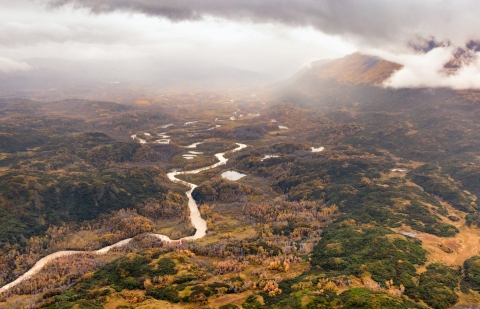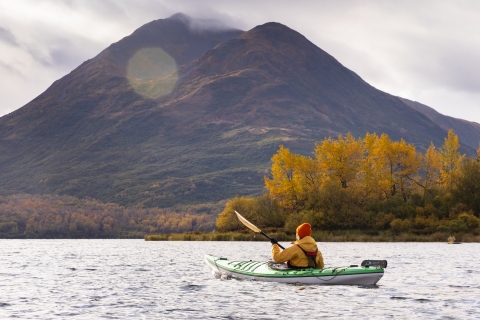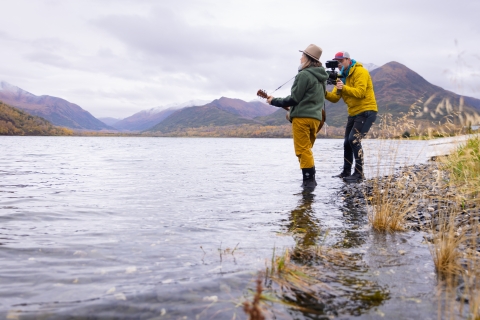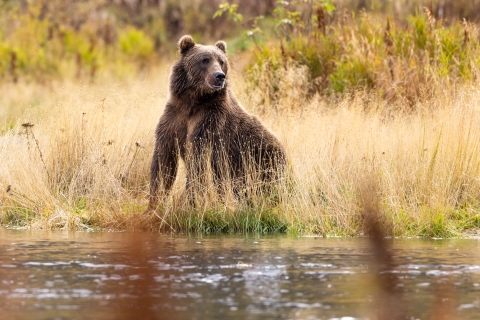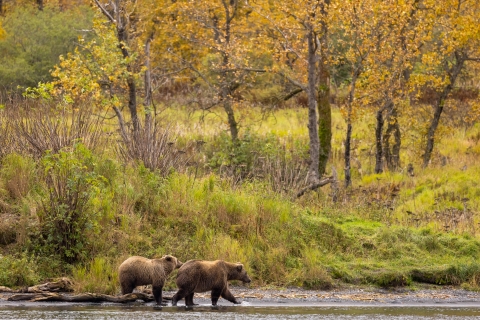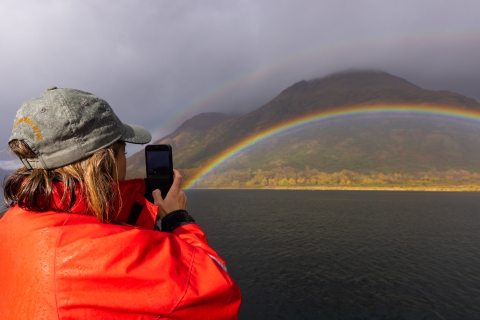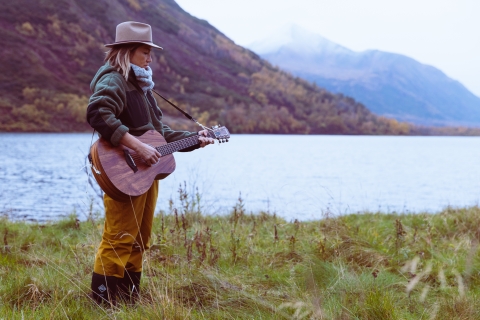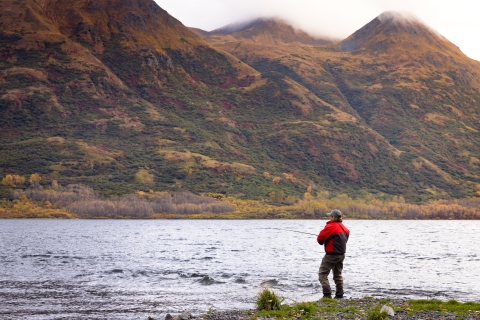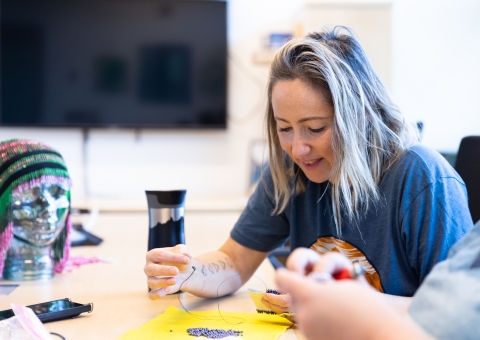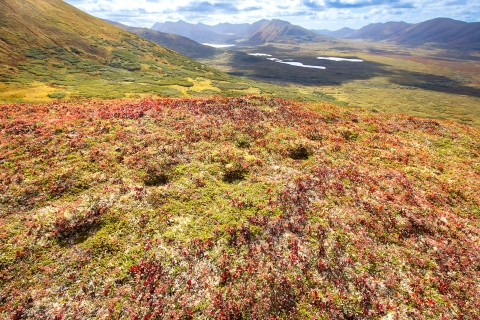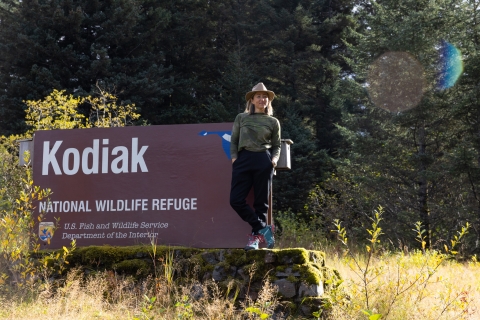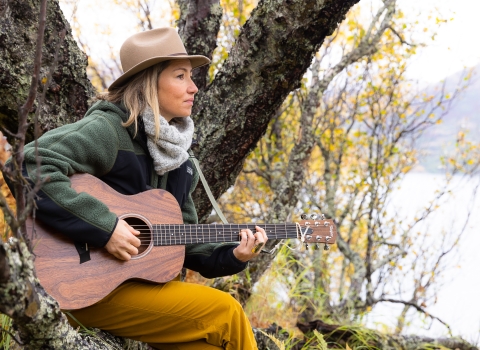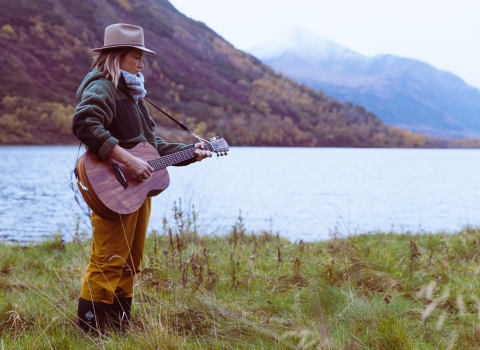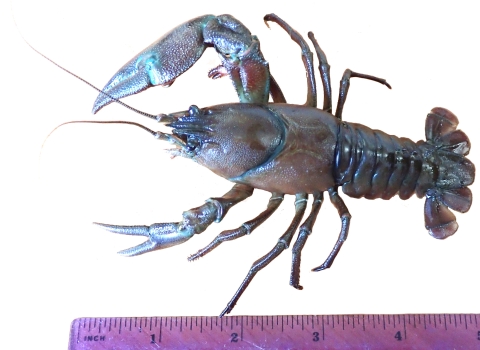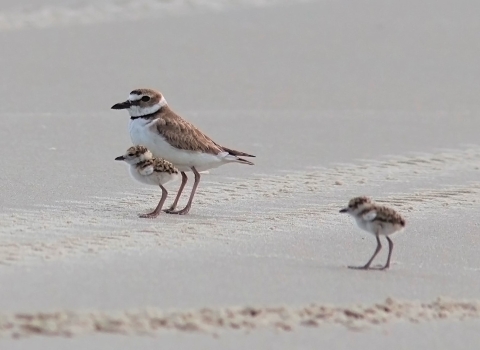Sitting at a picnic table by a lake on Kodiak Island, halfway around the world from where she grew up, KT Tunstall marveled at the similarities.
“It reminds me of the Isle of Skye, which is my favorite part of Scotland because it’s extremely dramatic. Flying over Kodiak Refuge to Karluk Lake was among the most incredible flights I’ve ever taken. There were these huge open plains and then we could see the glacier to the left and snowcapped mountains, and then rolling hills on the other side…”
Tunstall, a Scottish-born singer-songwriter and 5X Platinum and Grammy-nominated musician, teamed up with nonprofit Sustain Music and Nature and the U.S. Fish and Wildlife Service's Kodiak National Wildlife Refuge to create an original piece of music inspired by her time as an artist in residence on Kodiak. The global premiere of her song, Century Trail, released on April 21, 2023 and is accompanied by a music video filmed with Tunstall during her days writing the song at Karluk Lake.
Join us for a behind the scenes glimpse into the inspiration for the song and Tunstall’s reflections from her residency.
Seeing into the culture of bears
Tunstall arrived at Kodiak Refuge at the end of September, as the fall runs of salmon returned upstream and brown bears feasted on fish and berries. The Refuge was established in 1941 to protect and conserve Kodiak brown bears and their habitat, and Tunstall saw her first bear moments after landing.
Dr. Joy Erlenbach, refuge bear biologist, introduced Tunstall to bear biology and behavior on the island, where the abundance of salmon, berries, and vegetation supports some of the highest densities of brown bears ever recorded. As a result, Kodiak brown bears tend to have smaller home ranges and often share important fishing spaces during the peak of the runs, communicating and negotiating with each other to avoid a damaging conflict.
“It just kind of blew my mind, learning they don’t really like fighting each other,” she said. “Here you’ve got these apex predators living, it seems, harmoniously and having a great life here because there is so much food.”
Tunstall reflected on what she called “a hopeful message from bears – the behavior that I've learned about has just made me think a lot about the assumptions that we make about people's behavior. Seeing into that bear culture a little bit, it's kind of given me more faith in nurturing a community where people have what they need, meaning you have a more harmonious world.”
Listening for stories and creating “Century Trail”
Before arriving on Kodiak, Tunstall wrote an initial lyric to challenge herself:
Held in the folds of tectonic tales are stories untold from untraveled trails.
“I've always been really fascinated by mountains and the creation of mountain ranges: you get this cross section, where you see all this history rising up into the sky,” she said, while surrounded by the rugged peaks and steep valleys carved during Kodiak’s last ice age.
From the moment she landed, Tunstall began listening for the stories of the island and the refuge.
“When you come somewhere this tranquil and beautiful and serene, but also dramatic, it kind of silences you. And it’s quite easy to think that the piece of music that you might write would be extremely sparse, gentle, maybe kind of guitar picking or ethereal, ambient.”
Standing beside the lake with her guitar, Tunstall began to pick and hum.
Though she began the song quietly, Tunstall said she was surprised at how forceful the song became. She wanted to acknowledge "just all of the life that’s been lived here,” and recognized the complexity of celebrating place and people.
“It’s easy for us to visit and take photos, but this is home to these communities and wildlife. This song is a tribute to the line of history and ancestry, from way back when the bears made their way to Kodiak Island across the ice, all the way to present day.”
During her residency, Tunstall learned about Alutiiq culture and some of Kodiak’s history, spending time with community members, visiting the Alutiiq Museum, and beading with a local Alutiiq artist. Alutiiq Sugpiaq people are the original stewards of the lands and waters that now make up Kodiak Refuge, and continue to live in relationship with the place that has been a homeland for more than 7,500 years.
“I’ve got this line leading into the chorus - hold me steady while I cast my line into the past behind me - I've really kind of embraced my passion for fishing out here. Just the act of fishing is a beautiful thing and very, very present. So this is a real time lyric about fishing, and also about casting your interest and curiosity behind you to look into what's happened. It's a line about learning and also about curiosity and respect.”
Tunstall spent most of her week at Camp Island in Karluk Lake, which is jointly owned and managed by the refuge and Koniag, an Alutiiq Alaska Native Regional Corporation that serves more than 4,400 Alaska Native shareholders. Koniag’s Brown Bear Center on Camp Island hosted Tunstall for activities and an evening dinner with an impromptu concert, sharing hospitality and more stories. The time she spent practicing salmon skin sewing and beadwork of a spirit pouch with Alutiiq artist Kayla McDermott also emerged in a lyric, “I’ll keep you close, and thread the needle through the eye.”
Tunstall found the inspiration for what became her chorus early in the residency, as she learned that bears have created indelible trails of footprints in the mountains, deep imprints in the earth formed as they walk in the same tracks over generations – sometimes called a “century trail.” Over and over. We step in the same place until it becomes a century trail.
“You know, as human culture, we cave painted, we wrote on stone, we made artifacts, pottery, jewelry, all these things that told stories. I like to think of these century trails as bears’ way of leaving a history of their own culture.”
“And it was just such a poetic idea and an amazing kind of real-life metaphor for history and stories of the land, told by bears.
And so I decided to call the song, 'Century Trail.'”
MORE:
About KT Tunstall's Residency at Kodiak Refuge
BONUS behind the scenes video: KT Tunstall sings the Kodiak Refuge Salmon Song with Main Elementary Students.
Read about other Alaska refuge-inspired art and artist residencies:


